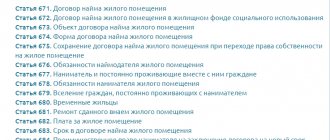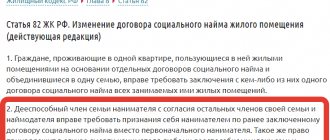Today, some categories of the population may qualify for housing from the state. The transfer of real estate is carried out on the basis of a social tenancy agreement. By concluding a deal, the state seeks to satisfy the need for housing among people who do not have enough funds of their own to purchase real estate. A social tenancy agreement for residential premises is concluded when an apartment is transferred to the disposal of a citizen. The exact list of actions that a person can carry out with the housing received is enshrined in the current legislation. We will talk further about the grounds for concluding a social rental agreement for residential premises, the necessary papers and the features of drawing up the agreement.
What form does it take?
Before you receive a social tenancy agreement for an apartment, it is worth understanding in what form the document is drawn up. To do this, you need to refer to Article No. 51 of the RF Housing Code. The regulation states that the agreement can only be drawn up in writing.
The document is an administrative act. It is drawn up unilaterally. The information contained in the contract must also meet the established requirements. The document must specify the parties to the transaction, their rights and obligations that will arise after signing the paper. To simplify the procedure for drawing up an agreement, experts advise using a sample social tenancy agreement.
Application Procedure
To qualify for a social tenancy agreement, a citizen must submit an application. The agreement is being drawn up by the Department of Housing Policy. You can also contact the administration through the MFC. A citizen who wants to receive housing from the state must prepare a package of documentation.
The list of papers must include:
- passport;
- completed application;
- identification documents of all family members of the applicant;
- a certificate confirming that the property is municipal property;
- documentation that serves as the basis for a citizen to move into an apartment;
- certificates of relationship with persons who will be included in the contract;
- documentation confirming the fact that there are no outstanding payments.
The list of papers may change. If the applicant is married, he must attach to the established list a certificate of official registration of the relationship or a document confirming that the person is divorced. An application for a social tenancy agreement can be drawn up in free form.
The application is reviewed within a month. If the paper is accepted, the institution’s employees will not require additional documents. There is no need to pay for social hiring.
When the papers are prepared, you need to contact the MFC or administration. Having received the application, employees of the selected institution will check the correctness of the document, as well as the compliance of the prepared list with the established requirements. If all documents are drawn up in accordance with the rules, the application will be registered in the database. The applicant will be provided with an extract on which the date of acceptance of the application and information about the period during which it will be possible to find out the decision will be recorded.
Video
Control over the implementation of administrative regulations for the provision of public services in the city of Moscow is carried out by the Main Control Department of the city of Moscow: + 7 (495) 633-63-99.
Pre-trial (out-of-court) procedure for appealing decisions and actions (inaction) of the Department, the State Budgetary Institution of the MFC of Moscow, officials of the Department, and employees of the MFC
1. The applicant has the right to file a pre-trial (out-of-court) complaint against decisions and (or) actions (inactions) taken (committed) in the provision of public services by the Department, the State Budgetary Institution of the MFC of Moscow, their officials, civil servants of the Department, and employees of the MFC.
2. The filing and consideration of complaints is carried out in the manner established by Chapter 2.1 of the Federal Law of July 27, 2010 N 210-FZ “On the organization of the provision of state and municipal services”, the Regulations on the specifics of filing and consideration of complaints about violations of the procedure for the provision of public services in the city of Moscow , approved by Decree of the Moscow Government of November 15, 2011 N 546-PP “On the provision of state and municipal services in the city of Moscow”, these Regulations.
3. The applicant may file complaints in the following cases:
3.1. Violations of the deadline for registering a request (application) and other documents necessary for the provision of public services, as well as the procedure for processing and issuing a receipt for receiving a request and other documents (information) from the applicant.
3.2. Requirements from the applicant:
3.2.1. Documents or information or the implementation of actions, the provision or implementation of which is not provided for by the regulatory legal acts of the Russian Federation and the city of Moscow for the provision of public services, including documents obtained using interdepartmental information interaction.
3.2.2. Applications for the provision of services not included in the list of services approved by the Moscow Government that are necessary and mandatory for the provision of public services.
3.2.3. Payment of fees for the provision of public services not provided for by regulatory legal acts of the Russian Federation and the city of Moscow.
3.2.4. Documents or information, the absence and (or) unreliability of which was not indicated during the initial refusal to accept documents necessary for the provision of a public service, or in the provision of a public service, except for the cases provided for in paragraph 4 of part 1 of Article 7 of the Federal Law of July 27, 2010 N 210-FZ “On the organization of the provision of state and municipal services.” This provision, in the event of a pre-trial (out-of-court) appeal by the applicant against decisions and actions (inaction) of the MFC, an MFC employee regarding the initial refusal to provide a public service, applies if the MFC is entrusted with the function of providing the relevant public services in full in the manner specified in Part 1.3 Article 16 of the Federal Law of July 27, 2010 N 210-FZ “On the organization of the provision of state and municipal services”.
3.3. Violations of the deadline for the provision of public services.
3.4. Refusal to the applicant:
3.4.1. In accepting documents, the submission of which is provided for by the regulatory legal acts of the Russian Federation and the city of Moscow for the provision of public services, on grounds not provided for by the regulatory legal acts of the Russian Federation and the city of Moscow.
3.4.2. In the provision of public services on grounds not provided for by the regulatory legal acts of the Russian Federation and the city of Moscow.
3.4.3. In the correction of typographical errors and errors in documents issued as a result of the provision of public services, or in case of violation of the established deadline for such corrections.
3.5. Other violations of the procedure for providing public services established by regulatory legal acts of the Russian Federation and the city of Moscow.
4. Complaints about decisions and (or) actions (inaction) of officials, state civil servants of the Department are considered by the head (authorized deputy head) of the Department.
Complaints about decisions and (or) actions (inaction) of the head of the Department, including decisions made by him or his deputy on complaints received in a pre-trial (extrajudicial) manner, are considered by a higher executive body of the city of Moscow in accordance with clauses 5.6, 6 of the appendix 6 to the resolution of the Moscow Government of November 15, 2011 N 546-PP “On the provision of state and municipal services in the city of Moscow.”
Complaints about decisions and (or) actions (inaction) of MFC employees made when providing government services in accordance with agreements on interaction concluded with the executive authorities of the city of Moscow, local government bodies, and organizations subordinate to them are considered by the director (authorized deputy director) of the State Budgetary Institution MFC city of Moscow.
Complaints about decisions and (or) actions (inaction) of the director (authorized deputy director) of the State Budgetary Institution of the MFC of the city of Moscow, accepted on complaints received in a pre-trial (extrajudicial) manner, are considered by a higher executive body of the city of Moscow in accordance with paragraphs 5.6, 6 of Appendix 6 to Resolution of the Moscow Government of November 15, 2011 No. 546-PP “On the provision of state and municipal services in the city of Moscow.”
5. Complaints can be submitted to the executive authorities of the city of Moscow, local government bodies, organizations subordinate to them authorized to consider complaints in accordance with these Regulations (hereinafter referred to as the bodies and organizations authorized to consider complaints), in writing on paper, in electronic form in one of the following ways:
5.1. Upon personal application by the applicant (applicant’s representative).
5.2. Through MFC.
5.3. By post.
5.4. Using the official websites of bodies and organizations authorized to consider complaints on the Internet.
6. The complaint must contain:
6.1. The name of the body (organization) authorized to consider the complaint or the position and (or) last name, first name and patronymic (if any) of the relevant official to whom the complaint is sent.
6.2. The name of the executive authority of the city of Moscow, the MFC or the position and (or) surname, first name, patronymic (if any) of the official, state civil servant of the city of Moscow, employee of the MFC, whose decisions and (or) actions (inaction) are being appealed.
6.3. Last name, first name, patronymic (if available), information about the place of residence of the applicant - an individual, as well as contact telephone number(s), email address(es) (if available) and postal address to which the response should be sent to the applicant.
6.4. The date of submission and registration number of the request (application) for the provision of a public service (except for cases of appealing the refusal to accept the request and its registration).
6.5. Information about decisions and (or) actions (inactions) that are the subject of appeal.
6.6. Arguments on the basis of which the applicant does not agree with the appealed decisions and (or) actions (inactions). The applicant may submit documents (if any) confirming the applicant’s arguments, or copies thereof.
6.7. Applicant's requirements.
6.8. List of documents attached to the complaint (if any).
6.9. Date of filing the complaint.
7. The complaint must be signed by the applicant (his representative). If a complaint is filed in person, the applicant (applicant's representative) must provide an identification document.
The authority of the representative to sign the complaint must be confirmed by a power of attorney issued in accordance with the legislation of the Russian Federation.
The status and powers of legal representatives of an individual are confirmed by documents provided for by federal laws.
8. A received complaint must be registered no later than the working day following the day of receipt.
9. The maximum period for consideration of a complaint is 15 working days from the date of its registration. The period for consideration of the complaint is 5 working days from the date of its registration in cases of appeal by the applicant:
9.1. Refusal to accept documents.
9.2. Refusal to correct typos and errors made in documents issued as a result of the provision of public services.
9.3. Violations of the deadline for correcting typos and errors.
10. Based on the results of consideration of the complaint, a decision is made to satisfy the complaint (in whole or in part) or to refuse to satisfy the complaint.
11. The decision must contain:
11.1. The name of the body or organization that considered the complaint, position, surname, first name, patronymic (if any) of the official who made the decision on the complaint.
11.2. Details of the decision (number, date, place of adoption).
11.3. Last name, first name, patronymic (if any), information about the place of residence of the applicant - an individual.
11.4. Last name, first name, patronymic (if any), information about the place of residence of the applicant’s representative who filed the complaint on behalf of the applicant.
11.5. Method of filing and date of registration of the complaint, its registration number.
11.6. Subject of the complaint (information about the decisions, actions, or inactions being appealed).
11.7. The circumstances established during the consideration of the complaint and the evidence confirming them.
11.8. Legal grounds for making a decision on a complaint with reference to the applicable regulatory legal acts of the Russian Federation and the city of Moscow.
11.9. The decision taken on the complaint (conclusion on the satisfaction of the complaint or refusal to satisfy it).
11.10. Measures to eliminate identified violations and deadlines for their implementation (if the complaint is satisfied).
11.10(1). Information about the actions carried out by the executive authority of the city of Moscow, the local government body, an organization subordinate to the executive authority and the local government body that provides public services, the MFC in order to immediately eliminate identified violations in the provision of public services, as well as apologies for the inconvenience caused and information about further actions that the applicant needs to take in order to receive public services (if the complaint is satisfied).
11.10(2). Reasoned explanations about the reasons for the decision made (in case of refusal to satisfy the complaint).
11.11. Procedure for appealing a decision.
11.12. Signature of the authorized official.
12. The decision is made in writing using official forms.
13. The measures to eliminate identified violations specified in the decision include:
13.1. Cancellation of previously made decisions (in whole or in part).
13.2. Ensuring the acceptance and registration of the request, execution and issuance of a receipt to the applicant (in case of evasion or unreasonable refusal to accept documents and their registration).
13.3. Ensuring registration and delivery to the applicant of the result of the provision of a public service (in case of evasion or unreasonable refusal to provide a public service).
13.4. Correction of typos and errors made in documents issued as a result of the provision of public services.
13.5. Refund to the applicant of funds, the collection of which is not provided for by the regulatory legal acts of the Russian Federation and the city of Moscow.
14. The body or organization authorized to consider the complaint refuses to satisfy it in the following cases:
14.1. Recognition of the appealed decisions and (or) actions (inactions) as legal and not violating the rights and freedoms of the applicant.
14.2. Filing a complaint by a person whose powers have not been confirmed in the manner established by regulatory legal acts of the Russian Federation and the city of Moscow.
14.3. The applicant does not have the right to receive public services.
14.4. Availability:
14.4.1. A judicial act on the applicant’s complaint with identical subject matter and grounds that has entered into legal force.
14.4.2. Decisions on a complaint made earlier in a pre-trial (out-of-court) manner in relation to the same applicant and on the same subject of the complaint (except for cases of appealing previously made decisions to a higher authority).
15. The complaint must be left unanswered on its merits in the following cases:
15.1. The presence in the complaint of obscene or offensive language, threats to the life, health and property of officials, as well as members of their families.
15.2. If the text of the complaint (part of it), last name, postal address and email address are not readable.
15.3. If the complaint does not indicate the name of the applicant (the applicant's representative) or the postal address and email address to which the response should be sent.
15.4. If the body or organization authorized to consider the complaint received a request from the applicant (the applicant’s representative) to withdraw the complaint before a decision on the complaint is made.
16. The decision to satisfy the complaint or to refuse to satisfy the complaint is sent to the applicant (the applicant’s representative) no later than the working day following the day of its adoption, to the postal address specified in the complaint. At the request of the applicant, the decision is also sent to the email address specified in the complaint (in the form of an electronic document signed with the electronic signature of an authorized official). In the same manner, the applicant (the applicant’s representative) is sent a decision on the complaint, in which only an email address is indicated for the response, and the postal address is missing or cannot be read.
17. If the complaint is left unanswered on the merits, the applicant (his representative) is sent, no later than the working day following the day of registration of the complaint, a written motivated notification indicating the grounds (except for cases where the postal address and email address are not indicated in the complaint email for a response or they are unreadable). The notice is sent in the manner established for sending a decision on a complaint.
18. A complaint filed in violation of the rules on competence established by paragraph 5.4 of these Regulations is sent no later than the working day following the day of its registration to the body authorized to consider the complaint, with simultaneous written notification to the applicant (his representative) about the redirection complaints (except for cases where the complaint does not indicate a postal address and email address for a response or they are not legible). The notice is sent in the manner established for sending a decision on a complaint.
19. Filing a complaint in a pre-trial (out-of-court) manner does not exclude the right of the applicant (applicant’s representative) to simultaneously or subsequently file a complaint in court.
20. Informing applicants about the judicial and pre-trial (extrajudicial) procedure for appealing decisions and (or) actions (inactions) committed in the provision of public services should be carried out by:
20.1. Placing relevant information on information stands or other sources of information in places where public services are provided.
20.2. Consulting applicants, including by telephone, email, and in person.
21. If, during or as a result of consideration of a complaint, signs of an administrative offense or crime are established, the official empowered to consider the complaint immediately forwards the available materials to the prosecutor's office.
If violations of the procedure for the provision of public services of the city of Moscow are identified, the responsibility for which is established by the Code of the City of Moscow on Administrative Offenses, the official empowered to consider the complaint must also send copies of the available materials to the Main Control Department of the city of Moscow within two working days following after the day the decision on the complaint was made (but no later than the working day following the day of expiration of the period established by the legislation of the Russian Federation for consideration of complaints about violations of the procedure for the provision of public services).
Do I need to renegotiate?
The social tenancy agreement has no validity period. This rule is enshrined in Article No. 60 of the Housing Code of the Russian Federation. However, today there are 3 reasons that lead to the need to renew the agreement. They are enshrined in Article No. 82 of the Housing Code of the Russian Federation.
The need to conclude a social tenancy agreement may arise if:
- the person who acted as the tenant of the apartment decided to re-register the agreement to one of his family members;
- the citizen who occupied the property died;
- persons who lived in the same property and had different social tenancy agreements became one family.
In the latter situation, one agreement will be required. In order for a social tenancy agreement to be reissued, you will need to prepare a package of documentation.
It must include:
- previous social rental agreement for residential premises;
- a copy of the order;
- passport or birth certificate of all persons living in the property;
- a certificate from the BTI containing characteristics of the property;
- a receipt confirming timely payment of utility bills;
- a copy of the documentation regulating the reason for the re-registration of the transaction.
If at least one of the documents established by current legislation is missing, the renewal of the agreement will be refused.
The concept of social hiring
The concept of social rent implies the conclusion of an agreement for the use of living space under certain conditions and for a certain time. The difference with commercial transactions is only two points:
- in the ownership of rented living space - the owner of social housing is always municipal authorities, in other agreements the owner can be either an individual or any company or firm;
- in terms of the provision of apartments, the family will receive “social benefits” for indefinite use, and a private contract is concluded for a specific time.
In case of social hiring, relations between the parties are regulated by the Housing Code of the Russian Federation and decrees of regional authorities.
Drawing up an additional agreement
In practice, a number of situations may arise that will require drawing up an additional agreement.
When concluding a social rental agreement for residential premises, the provisions of the current legislation must be observed. They record the order of the procedure.
The need for it arises in the following situations:
- there is a change in the postal address of the property;
- the status of the residential premises has changed;
- a major renovation was carried out and the area of the apartment was reduced or increased;
- family composition has changed;
- The name of the tenant or one of the persons living with him in the apartment has changed.
If the rights of one of the citizens in connection with the population of real estate are violated, he has the right to file an application in court. In this situation, it will be necessary to prove the fact of illegal actions. To do this, it is allowed to use a voice recorder or include in the package of documents a written refusal that was carried out unlawfully.
Other reasons for changing the social tenancy agreement
In addition to the cases considered, circumstances specified in the Housing Code of the Russian Federation may arise that actually change the contract, namely:
- Acceptance by citizens of a vacated room as part of a “communal apartment” under a social tenancy agreement. Such housing is provided upon application, in order of priority; the procedure for providing housing is clearly regulated (see Article 59).
- Forced eviction of a family member from a home by court, while the status of other living citizens does not change (see Art. 91).
- Accommodation of other persons as relatives of the tenant (see Article 70).
- Providing the tenant with other housing for the duration of the work (major repairs, reconstruction), if it is not possible to carry out such activities without evicting the tenants (see Article 88).
These situations change the subject composition of legal relations, and in the latter case, the subject of legal relations—the living quarters—changes temporarily. Accordingly, the social tenancy agreement undergoes significant changes with the onset of these circumstances.
Author of the article
How to register through the multifunctional center?
An application for concluding a social rental agreement for residential premises can be submitted through the MFC. If a citizen decides to use this method of appeal, he will need to prepare a standard list of documentation. If all the papers are collected correctly, the employees of the multifunctional center will accept the application and begin consideration.
The decision will be made within 30 days from the date of submission of documents. When the verdict is known, the applicant receives notice of the result of the procedure. If the decision is positive, an agreement will be drawn up for the transfer of the municipal apartment for use.
What additional documents do you need to prepare?
following may additionally be required as additional documents for the free execution of a privatization agreement
- A cadastral passport for an apartment, which can be requested at the Cadastral Chamber, a multifunctional center, as well as on the Internet resource of Rosreestr, after providing your passport and submitting an application; This document is prepared within 5 working days from the date of application.
- Powers of attorney, order appointing a guardian, etc.
Each extract that needs to be requested from various government authorities has a limited validity period; accordingly, you should start processing with those that are valid for a longer period of time. In addition, the citizen should take note of the deadlines for preparing certificates and statements and rely on this information when completing a package of documents.
As can be seen from the list of documents, obtaining some of them requires making a monetary payment in one amount or another. The very execution of the privatization agreement does not provide for the payment of state duty for this service .
Features of restoring a lost agreement
If the social tenancy agreement has been destroyed or lost, the document can be restored. When figuring out where to get the paper again, you need to take into account that when the registration procedure is carried out, the citizen writes two copies of the social tenancy agreement. One of them is given to the tenant, and the other remains with the landlord. If the administration acts as the owner of the property, and its representative signed the contract, it is there that you must apply for restoration. You must have a prepared package of documentation with you.
It may include:
- passports or birth certificates of all family members who are registered in the residential premises;
- a certificate of family composition and an extract from the house register;
- personal account statement;
- certificate of divorce or marriage, if any.
Please note that statements are valid for 14 days from the date of receipt. Therefore, it is worth doing them immediately before applying. A sample paper will help you understand the specifics of drawing up a contract. The second copy of the document is provided within a month after the application. If a citizen acting as an employer dies, the social tenancy agreement will not be provided to another person. The document will need to be reissued in the name of one of the employer’s family members.
Video
It must be taken into account that the agreement not only confers rights, but also imposes a list of responsibilities. Failure to comply with them will result in violation of housing rights. A social tenancy agreement allows you to receive real estate from the state. The document regulates legal relations in the area of use of residential premises that are owned by the municipality. All legal relations are carried out on the basis of the provisions of the Housing Code of the Russian Federation.
Who can benefit from social hiring?
The basic criteria for how to obtain municipal housing are determined by the provisions of the Housing Code. The list of citizens entitled to state support in providing housing is limited and includes the most vulnerable categories in terms of financial situation. In addition to the basic income limit, certain conditions must be met:
- the citizen does not own any housing;
- non-compliance of existing housing with sanitary and fire standards (emergency, dilapidated houses);
- the presence in the family of a permanently living disabled person with a disease included in the list of the Government of the Russian Federation of 2014 No. 817;
- failure to achieve the area of the existing apartment at the level defined by law as a social norm.
Families or single citizens who fall under these conditions and whose status can be classified as low-income can stand in line with municipal authorities to provide them with housing under a social rental agreement.
In addition, there are categories of applicants who have priority right to receive an apartment. These include:
- living in housing recognized as dilapidated or in disrepair and beyond repair;
- children left without parents and taken into care by the state;
- illegally convicted citizens released from prison and left without housing due to a judicial error;
- persons with severe chronic diseases and persons with confirmed disabilities.
Local authorities may, at their discretion, expand this list and include large families with a certain number of children, families of veterans of the Great Patriotic War. In each Russian region, the conditions for those who are eligible to apply for social housing vary and depend on the decisions of local authorities.
Important! Citizens who were registered to receive a municipal apartment in the period before 2005 a priori retain their turn. However, they are not required to confirm their financial situation and compliance with the criteria for those in need reflected in the new legislation.






